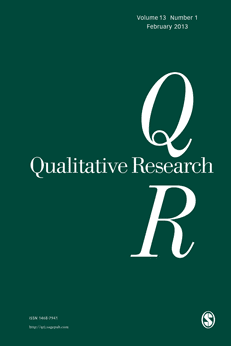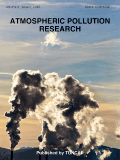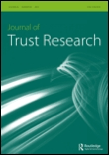
Qualitative Research
Scope & Guideline
Empowering researchers with cutting-edge qualitative insights.
Introduction
Aims and Scopes
- Air Quality Assessment and Monitoring:
Focus on the evaluation of air quality through various methodologies, including the use of sensors, satellite data, and field studies to measure particulate matter (PM) concentrations and their health impacts. - Source Apportionment Studies:
Investigation into the sources of air pollutants such as PM2.5 and VOCs, utilizing advanced techniques like machine learning and receptor models to identify contributors to air quality deterioration. - Health Impact Analysis:
Research assessing the health implications of exposure to air pollutants, including respiratory diseases, cardiovascular effects, and other health risks associated with particulate matter and gases. - Mitigation Strategies and Policy Evaluation:
Exploration of strategies for reducing air pollution through policy assessments, technological innovations, and community-based interventions aimed at improving air quality. - Climate Change Interactions:
Examination of how climate change influences air quality and the reciprocal effects of air pollution on climate patterns, particularly in urban environments. - Emerging Technologies in Air Quality Management:
Focus on innovative technologies and methodologies for monitoring and improving air quality, including the use of low-cost sensors and modeling techniques.
Trending and Emerging
- Impact of COVID-19 on Air Quality:
A significant trend is the exploration of how the COVID-19 pandemic has affected air quality, with numerous studies analyzing changes in pollutant levels during lockdowns and the implications for future air quality management. - Machine Learning Applications:
There is a growing focus on the application of machine learning techniques for predicting air quality and identifying pollution sources, marking a shift towards data-driven research methodologies. - Health Risk Assessments Related to Air Pollution:
An increasing number of studies are dedicated to quantifying health risks associated with air pollution exposure, driven by public health concerns and the need for evidence-based policy-making. - Community Engagement in Air Quality Management:
Emerging themes include the role of community participation and public engagement in air quality initiatives, indicating a shift towards more inclusive approaches to environmental health. - Technological Innovations in Air Monitoring:
Advancements in air monitoring technologies, particularly low-cost sensors and real-time data collection methods, are becoming a focal point for researchers aiming to enhance air quality assessments.
Declining or Waning
- Historical Pollution Trends:
While historical analyses of air pollution trends were once common, recent publications are shifting towards contemporary assessments and real-time data, reflecting a move towards immediate concerns over long-term historical analyses. - Indoor Air Quality Studies:
There has been a noticeable decrease in papers focused specifically on indoor air quality, as attention has moved towards broader outdoor air pollution issues and their public health implications. - Generalized Air Quality Modeling:
Research focusing on generalized air quality models is declining in favor of more localized and specific studies that utilize advanced techniques for precise air pollution source identification and impact assessment.
Similar Journals

Atmospheric Pollution Research
Championing the fight against atmospheric pollution.Atmospheric Pollution Research is a pivotal journal within the realms of Atmospheric Science and Environmental Science, published by the Turkish National Committee on Air Pollution Research and Control (TUNCAP). With an impressive impact, it holds a Q2 ranking in Atmospheric Science and Waste Management and Disposal, and a Q1 ranking in Pollution as of 2023, underscoring its significance and influence in the field. The journal's ISSN 1309-1042 facilitates the dissemination of cutting-edge research addressing contemporary issues in air quality and pollution management. Spanning a convergence of years from 2010 to 2024, it publishes original articles, reviews, and case studies that are essential for advancing knowledge in air pollution and its environmental impacts. Researchers, professionals, and students worldwide will find this journal to be an invaluable resource for staying updated on the latest findings and innovations aimed at mitigating the effects of atmospheric pollution.

Rocznik Ochrona Srodowiska
Advancing Environmental Science for a Sustainable FutureRocznik Ochrona Srodowiska, published by the Middle Pomeranian Scientific Society for Environmental Protection, is an esteemed journal dedicated to advancing the field of environmental science in Poland and beyond. With an ISSN of 1506-218X, this peer-reviewed journal has established itself as a vital resource since its inception in 2007, addressing various environmental issues and promoting sustainable practices. Currently holding a Q3 category ranking in the Environmental Science (miscellaneous) field for 2023, it places itself in the 23rd percentile of Scopus rankings, reflecting a growing influence in the broader environmental research community. While the journal is not open access, it serves as an important conduit for researchers, professionals, and students to disseminate their findings and contribute to the interdisciplinary dialogue aimed at tackling pressing environmental challenges. With a commitment to rigorous research and practical applications, Rocznik Ochrona Srodowiska remains an essential platform for fostering innovation and collaboration in environmental studies.

ATMOSFERA
Your Gateway to Atmospheric Science ExcellenceATMOSFERA is a prestigious journal published by CENTRO CIENCIAS ATMOSFERA UNAM, dedicated to advancing the field of Atmospheric Science. With an ISSN of 0187-6236 and an E-ISSN of 2395-8812, this bilingual journal has been a vital resource for researchers since its inception in 1988. Located in Mexico City, the journal serves as a platform for high-quality original research, reviews, and case studies that explore various atmospheric phenomena, climate issues, and environmental challenges. Although currently categorized in the Q4 quartile of Atmospheric Science, ATMOSFERA aims to contribute to the growing body of knowledge in the field and improve its ranking over the next few years, emphasizing rigorous scientific inquiry and fostering collaboration among scholars. Its accessibility and commitment to open communication make it an essential reference for professionals and students striving to understand and address complex atmospheric dynamics.

Atmosphere
Illuminating the Path to Environmental SustainabilityAtmosphere is a premier open-access journal dedicated to the field of atmospheric sciences, published by MDPI since 2010. With an E-ISSN of 2073-4433, the journal has established itself as a significant platform for the dissemination of research on atmospheric processes, climate change, and environmental dynamics. Based in Switzerland, the journal has garnered impressive recognition within the academic community, currently ranked in the 3rd quartile for Atmospheric Science and the 2nd quartile for Environmental Science (miscellaneous) as of 2023. Notably, it holds a commendable Scopus rank, emphasizing its impact with a 69th percentile standing in its category. Atmosphere aims to foster innovative research and comprehensive reviews that contribute to the understanding of air quality, climate policy, and environmental sustainability. Its open-access model not only supports the global sharing of knowledge but also enhances visibility and engagement among researchers, professionals, and students alike, making it an essential resource for anyone invested in the study of our planet's atmosphere.

Health Scope
Navigating the complexities of health science.Health Scope, an esteemed journal published by BRIEFLAND, serves as a critical platform for disseminating significant research within the field of health sciences. With its ISSN 2251-8959 and E-ISSN 2251-9513, the journal aims to provide a comprehensive overview of health-related studies, fostering interdisciplinary collaboration and innovation. Although the journal is not open access, it is dedicated to maintaining high academic standards and rigorous peer review processes to ensure the dissemination of quality research. Located at 25 Derde Morgen, Shertogenbosch, 5233 NL, Netherlands, Health Scope invites contributions that explore diverse facets of health, including public health, epidemiology, and healthcare management. Researchers, professionals, and students alike will find this journal to be an invaluable resource for advancing their knowledge and enhancing their practice in the ever-evolving landscape of health sciences.

GEFAHRSTOFFE REINHALTUNG DER LUFT
Shaping the future of air purity through rigorous scholarship.GEFAHRSTOFFE REINHALTUNG DER LUFT is a reputable academic journal published by SPRINGER-V D I VERLAG GMBH & CO KG, dedicated to the critical examination of air contamination and its implications on public health and environmental policy. With an ISSN of 0949-8036 and an E-ISSN of 1436-4891, this journal has established itself as a key resource for researchers, professionals, and students alike since its inception in 1996. Operating under a stringent peer-review process, it focuses on various aspects of air quality management, toxicology, and the legal frameworks governing pollution control. Although categorized in the Q4 quartile for multiple areas including Health, Toxicology and Mutagenesis and Management, Monitoring, Policy and Law, the journal continues to play an important role in disseminating relevant research that aids in the understanding and mitigation of air pollution issues. As of 2023, it ranks in the 7th percentile across several environmental science categories, reflecting its niche but impactful presence in the field. Researchers looking to stay ahead in the study of air quality are encouraged to explore this journal, which is set to converge its insights through 2024 and beyond.

Journal of Climate Change
Exploring solutions to the climate crisis.The Journal of Climate Change, published by IOS PRESS, is a premier academic platform dedicated to the multidisciplinary investigation of climate change, its impacts, and mitigation strategies. With a focus on promoting innovative research, this journal aims to cultivate dialogue among researchers, policymakers, and environmental professionals globally. While the impact factor signifies its academic significance, the journal prides itself on providing unrestricted access to cutting-edge research insights, fostering collaboration within the scientific community. The journal’s ISSN is 2395-7611, and the E-ISSN is 2395-7697. Whether you are a seasoned researcher or a student exploring the critical implications of climate change, the Journal of Climate Change serves as an essential resource for the latest findings and discussions in this vital field.

Mausam
Advancing Atmospheric Insights with MausamMausam, an esteemed publication by the India Meteorological Department, serves as a pivotal platform for advancing research in the fields of atmospheric science and geophysics. With its origins tracing back to 1979, this journal has consistently provided valuable insights into weather patterns, climatic variations, and geophysical phenomena, making it a crucial resource for researchers and professionals in Earth and Planetary Sciences. Although it currently holds a Q4 rating in Atmospheric Science and Q3 in Geophysics as of 2023, the journal's commitment to rigorous scientific exploration fosters an enriching environment for emerging studies. The journal is indexed in Scopus with specific rankings highlighting its scope, ranking #116 out of 165 in Geophysics, and #130 out of 148 in Atmospheric Science. This reflects a growing global interest in the journal's contributions to vital areas of scientific inquiry. While Mausam is not available as an open-access journal, it remains accessible to a wide audience, providing critical research that informs both local and global meteorological practices. Researchers, students, and professionals alike are encouraged to engage with its rich archive, as it continues to evolve to meet the needs of the scientific community.

Journal of Trust Research
Advancing Insightful Research on Trust and RelationshipsThe Journal of Trust Research, published by Routledge Journals, Taylor & Francis Ltd, stands at the forefront of interdisciplinary inquiry into the concept of trust, spanning critical areas such as Applied Psychology, Sociology, and Business Management. Since its inception in 2011, this journal has been dedicated to fostering innovative research and dialogue around trust dynamics in various contexts, making significant contributions to understanding human relationships and social structures. With a commendable positioning in Q3 for its fields in the 2023 category quartiles, it serves as a vital resource for academics, practitioners, and students interested in the mechanisms and implications of trust. Though currently not offering open access, the journal boasts a reputation for rigorous peer review and impactful scholarship, ensuring that published articles resonate with both scholarly and practical communities. Researchers are encouraged to submit their work as the journal aims to advance theoretical frameworks and practical applications in trust research through to 2024 and beyond.

Aerosol Science and Engineering
Unveiling the Impact of Aerosols on Our WorldAerosol Science and Engineering is a pioneering journal dedicated to the interdisciplinary study of aerosols, their formation, properties, and their impact on environmental and human health. Published by Springer Nature, this journal aims to advance our understanding of aerosol behavior in various contexts, including atmospheric science, industrial applications, and pollution mitigation. With an ISSN of 2510-375X and an E-ISSN of 2510-3768, it benefits from a comprehensive Open Access model that ensures wide dissemination of research findings. Aerosol Science and Engineering is indexed in prestigious databases, holding a respectable Q3 quartile ranking in fields such as Environmental Chemistry and Materials Science for 2023. The journal’s scope spans from 2017 to its future convergence in 2024, making it a critical resource for researchers, professionals, and students alike who are striving to understand and innovate in the realm of aerosol science. Each published article contributes to the collective knowledge needed to address pressing environmental challenges and drive sustainable technological advancements.